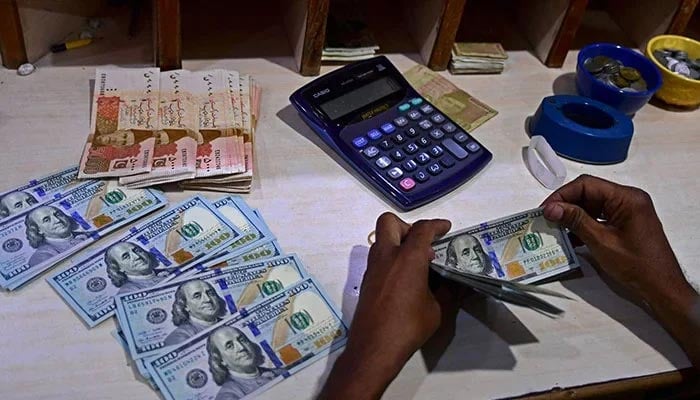Rupee rout continues amid 'tough' IMF demands
Local currency declines after PM Shehbaz said IMF is giving Pakistan a "tough time" amid loan talks, reports Bloomberg
The already under-pressure Pakistani rupee declined further against the dollar on Friday following Prime Minister Shehbaz Sharif's comments that the International Monetary Fund (IMF) is giving Pakistan a "tough time".
"As we speak, an IMF delegation is in Islamabad [holding parleys on loan programme] and giving a very tough time to the finance minister and his team,” the premier said while speaking at the Apex committee meeting in Peshawar, and termed the economic challenges "unimaginable".
At the day's close, the rupee plunged to Rs276.58, according to the State Bank of Pakistan (SBP), after losing Rs5.22 or 1.89% of its value. Meanwhile, the local currency closed at 283 in the open market.
Analysts have stressed that the country needs the Washington-based lender's bailout programme to avoid default — a threat that has been looming over Islamabad for some months now.
AA Commodities Director Adnan Agar told Geo.tv that the rupee’s downward spiral is expected till Pakistan secures a staff-level agreement with the Washington-based lender.
The analyst said that the market is reacting to the reports coming on the demands being put forward by the IMF to the government.
Agar warned that if the government fails to secure a staff-level agreement with the Fund, then the rupee will incur further losses.
“If the IMF deal is done timely then it would appreciate but not that much,” said Agar.
In a bid to curb the black market and meet IMF demands, the government and exchange companies removed the dollar cap — imposed to stabilise the dollar's value.
But that did not have a substantial effect on the local currency as the investors remain wary due to a surge in terrorism and the decline in State Bank of Pakistan-held foreign exchange reserves — which now stand at just $3.08 billion and will provide an import cover of 18.5 days.
ECAP General Secretary Zafar Paracha told Geo.tv that when the dollar cap was removed, it was estimated that the rupee would hit 270 and rebound, however, circumstances changed.
"Our reserves are at their lowest in nine years and terrorism — which isn't restricted to Peshawar — is also surging," he said, explaining the reason behind investors' lack of confidence in the government.
The ECAP general secretary added that the ongoing political turmoil was also adding to the country's woes as opponents are being arrested every other day and being put behind bars.
Paracha added that the black market gap has been met to a certain extent, but since the government has not opened the letters of credit (LCs) for importers, it will persist.
"The government has asked the importers to arrange dollars on their own [...] this is why the black market is still active. If this does not stop, the gap might even increase," he warned, urging the authorities to move towards import rationalisation.
Paracha added that amid the terror threat and other underlying reasons, the exports have not released their payments yet, resulting in the scarcity of dollars in the market.
-
Global memory chip crunch puts spotlight on Apple; Will iPhone become more pricey?
-
Bitcoin plummets toward $60,000 as investors dump risky bets
-
Bitcoin crashes below $63K as regulatory pressure and market fears grow
-
Bitwise Crypto Industry innovators ETF: What investors should do in 2026?
-
Nintendo shares slide again as momentum fears grow
-
Gold, silver prices fallen sharply; What’s driving the drop?
-
Gold’s record climb: Experts question if its safety is ‘overstated’
-
Dubai unveils plans to construct street built with real gold












